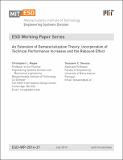An Extension of Dematerialization Theory: Incorporation of Technical Performance Increases and the Rebound Effect
Author(s)
Magee, Christopher L.; Devezas, Tessaleno C.
Downloadesd-wp-2014-21.pdf (980.7Kb)
Metadata
Show full item recordAbstract
Dematerialization is the reduction in the quantity of materials needed to produce something useful over time. Dematerialization fundamentally derives from ongoing increases in technical performance but it can be counteracted by demand rebound -increases in usage because of increased value (or decreased cost) that also results from increasing technical performance. A major question then is to what extent technological performance improvement can offset and is offsetting continuously increasing economic consumption. This paper contributes to answering this question by offering some simple quantitative extensions to the theory of dematerialization. An inequality criterion for dematerialization is developed that includes technical performance changes over time and demand rebound effects: the inequality highlights the importance of demand elasticity and the annual technical performance improvement rate. The paper then empirically examines the materials consumption trends as well as cost trends for a large set of materials and a few modern artifacts over the past decades. In all 57 cases examined, the particular combinations of demand elasticity and technical capability rate improvement for each case are consistent with continuation of materialization. Overall, the theory extension and empirical examination indicate that dematerialization and sustainability are significant challenges not easily met by undirected technological change.
Date issued
2014-07Publisher
Massachusetts Institute of Technology. Engineering Systems Division
Series/Report no.
ESD Working Papers;ESD-WP-2014-21